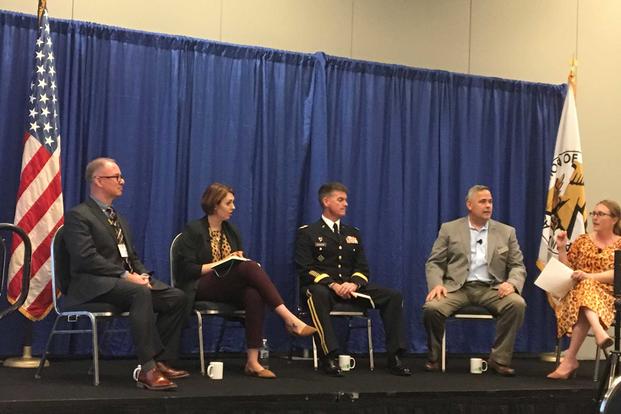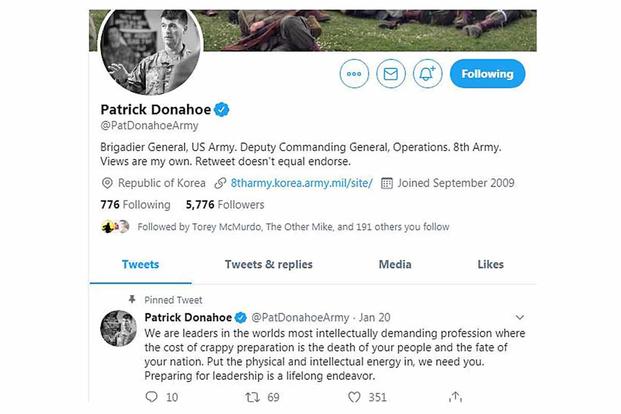A one-star general, an Army lieutenant, a popular cartoonist and the formerly anonymous administrator of a controversial community Facebook page walk onto a stage.
It's not the setup of an elaborate joke, but the foundation of a deeply nontraditional panel discussion at the Association of the United States Army's annual meeting in Washington, D.C. And it came with some very nontraditional advice.
The groundwork was laid for a conversation about the value of social media to military leaders by an essay posted by a four-star general. Army Gen. Robert Abrams, commander of United Nations Command, ROK-US Combined Forces Command, and United States Forces Korea, called on officers and other leaders to "get on the bus" with social media in order to stay part of the conversations taking place in their units.
"Your subordinates are all over social media," he wrote in an Oct. 10 post on the blog "From the Green Notebook."
"As such, these platforms provide another venue for them to have access to you -- think virtual open door policy. After establishing credibility, you might even get the chance to actually help people."

Social media credibility comes in various forms. On the panel were Army 1st Lt. Kelsey Cochran, whose profane commentary, wit and candor has turned her into a military Twitter celebrity; Steven Leonard, a retired Army officer and creator of the popular web comic Doctrine Man; Kenneth Ramos, a retired sergeant major who administrates the Facebook page Army WTF Moments; and Brig. Gen. Patrick Donahoe, deputy commanding general for operations with the Korea-based 8th Army.
Related: How Far Should You Lock Down Social Media?
Donahoe, a popular voice in the military Twitter community with nearly 6,000 followers, sought to further undercut conventional Army thinking.
Being open on social media, he said, is not as dangerous as it has been made out to be.
"We overstate the OpSec challenges that we've got," he said, referring to the military concept of operational security. "I mean, everything that is out there on social media is already in the public domain, right? And so, you know, if the Chinese want to archive all that and put it into some giant super computer and figure all that out, it's on them."
That doesn't mean everything's OK to tweet, he said. He mentioned his choice to repost a crowdsourced photo of military C-17 transport aircraft taking off from a popular aircraft spotting account. After being challenged by a user on security concerns, he deleted the tweet.
"There's the 'don't be stupid' rule, right?" he said. "If you're involved with, you know, some kind of secret-level exercise, program, etc., the standard rules apply. And there's Fight Club rules, right? I mean, first rule of Fight Club is, we don't talk about Fight Club."
Still, the military has a long history of warning troops and spouses against even basic personal disclosures on social media in the name of preserving OpSec. With the emergence of ISIS and episodes in which militants have attempted to target service members online, information protection measures have gotten even more extreme.
Leonard, or Doctrine Man, also urged against leaders using their subordinates' social media accounts to target them, saying it prevents healthy engagement. He said he'd heard about a female lieutenant who was counseled by a senior officer because photos she posted on Instagram showed her dancing with multiple men at a wedding. And other troops, he said, had recounted similar experiences.
"And that kept them from wanting to engage on social media," he said. "I have people say, 'I shut down all my social media accounts as a result of that.' I'd rather not be on social media than be called in and told who I can and can't dance with at a wedding."
Another sign of a new institutional perspective on social media emerging was the presence on the panel of Ramos, representing a page that routinely posts user-submitted information that casts the Army and soldiers in a less-than-flattering light; and Cochran, a public affairs officer who tweets candidly about her dating life and breakups, her own mental health struggles and personal observations about Army life.
"I do share a lot of information about my personal life, but I'd also say that I'm a thinking person and I share the level of detail that I'm comfortable sharing," Cochran said. " ... I'm not thrilled about people indiscriminately knowing I dyed my hair platinum blonde after that breakup. But I also think that the benefits and being very open and vulnerable and building rapport with a military audience, and a civilian audience as well, outweighs the negativity."
Cochran noted that her openness has resulted in genuine conversations about sexual assault and mental health, because people resonate with her authenticity.
"A lot of what I do online is trying to humanize service members," she said.
But how vulnerable should lieutenants be with, for example, the noncommissioned officers and junior enlisted soldiers who might be the same age as them or older they have a responsibility to lead? At this point, it's up to the individual officer to set boundaries.
"There still is this distance," Donahoe said of his own social media practices. "[If a sergeant messages me], I'm not sitting there shooting the s--- with him about the 14 White Claws I had the night before. For me, you're not going to see tweets from me about, this hangover was killing me, that was a rough night. ... Because that I think would be beneath the office. I think that maturity and everything else going up through the ranks, there's a cloak to how much you're going to let out."
-- Hope Hodge Seck can be reached at hope.seck@military.com. Follow her on Twitter at @HopeSeck.
Read More: Big Changes to Special Forces Course Draw Scrutiny














